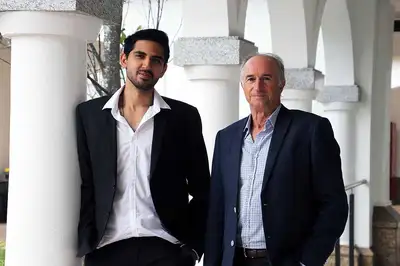
There are many cultural difference that entrepreneurs should consider when looking to secure capital from investors.
New research by a Massey University master’s student provides much-needed insight for early-stage entrepreneurs looking to secure capital from New Zealand investors. Master of Management student Hattaf Ansari worked with the university’s business start-up incubator – the ecentre – to identify differences in the criteria used by New Zealand and United States investors.
“We found that investors’ priorities were heavily influenced by their culture, as well as the characteristics of the market. It’s important for entrepreneurs to understand what local investors are looking for in early-stage ventures if they want to improve the efficiency of their capital-raising efforts,” Mr Ansari says.
This was the first survey of its kind to be conducted in New Zealand and, until now, start-ups have relied on anecdotal feedback and data from overseas, usually the United States.
Previous US research had identified 27 factors that investors look at when making an investment decision. Mr Ansari surveyed 88 active New Zealand investors to rate the importance of these factors – and compared the results to those of their US counterparts.
The most important factors for New Zealand investors were the trustworthiness of the entrepreneur, future growth potential of the start-up and the enthusiasm of the entrepreneur. There were some key differences in approach when compared to US investors, including the importance given to global ambitions, first impressions and the experience of the entrepreneur.

Massey master's student Hattaf Ansari and acting ecentre chief executive Dorian Scott.
Local versus international
New Zealand investors ranked domestic sales as their least important criteria, while US investors ranked it as one of the most important factors when assessing an investment opportunity.
“Most New Zealand investors look for ventures that have international reach and are easy to scale,” Mr Ansari says, “while US investors like to see potential in the market where they are based.”
The importance of first impressions
US investors ranked first impressions of the entrepreneur as the fifth most important criterion, while New Zealand investors ranked first impressions as the 15th most important factor.
“Often in the United States, it’s instant – ‘I like this person, I’m going to invest’,” ecentre acting chief executive Dorian Scott says. “But in New Zealand investors are more cautious when they form relationships, they want to get to know the founder to build trust, it’s a cultural thing.”
Mr Ansari says entrepreneurs need to be patient when raising capital in New Zealand, because it is important to build trust and show traction.
“Don’t just pitch and expect an immediate response – entrepreneurs need to follow up to give the investor the opportunity to form an opinion. New Zealand investors rate trust in the entrepreneur as the most important factor in an investment decision and this takes time.”
Experience versus expertise
The research project showed that US investors rate the expertise of the entrepreneur highly, while New Zealand investors are more likely to look for entrepreneurs with business or start-up experience.
“In the United States, if investors can see that you are good at what you do, that you have the right technical knowledge, then they have less concern if you are inexperienced as an entrepreneur – you could even be straight out of university,” Mr Ansari says.
“This is partly because many US investors have been successful entrepreneurs themselves and they are very likely to coach and mentor the start-ups they invest in.”
New Zealand, on the other hand, has fewer investors with start-up experience so, Mr Ansari says, there is a preference for teams who have been involved with a start-up before.
Mr Scott says the research will help entrepreneurs to better target investor criteria in New Zealand, rather than relying on popular opinion and overseas research.
“It is well established that culture impacts on investor behaviour and now we have data on how this affects New Zealand investors,” he says.
Copies of the report are available from ecentre.org.nz or emailing reception@ecentre.org.nz